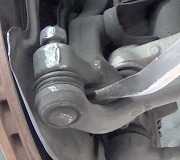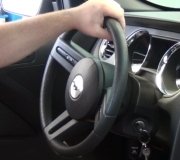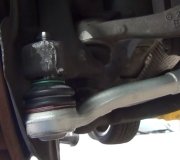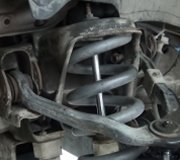Do you have reasonable mechanical skills? If so, I can describe the procedure but it will take longer to type it than to do it. Your best bet is to get a copy of the Ford service manual or buy a subscription to AllData or Mitchell. Check eBay for blackhatauctions. They used to go by the name lorieandjeff. They buy and sell a lot of original service manuals.
The procedure just requires removing a few nuts and wiggling the part out and back in, but one thing most do-it-yourselfers aren't aware of is you must have the car sitting with the tire on the ground, and bounce it a few times before you tighten the pivot bolt. That means crawling on the ground and squeezing underneath unless you have a drive-on hoist. Too many people tighten those bolts while the car is jacked up and the suspension is hanging down. That clamps the rubber bushing in that position, then when the car is lowered to its normal ride height, that bushing is in a permanent twist. That will greatly reduce its life.
Don't wait too long to replace this part if there's slop or movement between the ball and socket. Ford has WAY more trouble with suspension parts separating leading to loss of control and crashes than almost all other manufacturers combined. If it's making clunking or squeaking noises, I wouldn't even drive it until the worn part is replaced. The car should be aligned once the new part is installed too. No two control arms are ever exactly the same, and that will change "camber" which is the inward or outward tilt of the wheel as viewed from in front of the car. Besides the crash problem, Ford is also well-known for not providing a camber adjustment so you may be stuck with whatever you get, but changing camber will also cause a "toe" change on that wheel. That WILL always be adjustable. Toe is the direction a wheel is steering when the steering wheel is straight. It doesn't take much incorrect toe to cause tire wear and an off-center steering wheel.
SPONSORED LINKS
Saturday, January 5th, 2013 AT 11:19 AM




